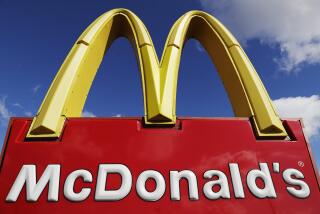Ads spin tough times into a ‘value’ purchase
- Share via
Tough economic times are making new cars, clothing and electronics a tough sell. So corporate marketers are trying a new message: We feel your pain.
Sprint Nextel Corp., for example, rolled out a TV commercial last week in which Chief Executive Dan Hesse, pitching his company’s cellphone services, acknowledged that “people are trying to be smarter with their money these days.”
Mike Goff, Sprint’s vice president of national advertising, said the company added the spot to its lineup to show families that it understands the pressures they’re facing.
“It made sense to acknowledge the economic situation,” he said. “We understand that times are tough. Rather than ignore it, we wanted to take it head on.”
With October retail sales the slowest since 1971 and automakers posting huge third-quarter losses, companies across the country are struggling to persuade consumers to buy their goods and services. On Friday, less than a week after launching its TV spot, Sprint posted a double-digit drop in quarterly revenue.
Motivating people to buy during one of the worst economic slowdowns in decades is challenging marketers.
“We’re moving toward an era of conscious consumption -- just because I can afford to buy something doesn’t mean I’m going to buy it,” said Mike Sheldon, president of ad agency Deutsch LA. “People are questioning their need to spend.”
The best way to persuade them to buy, advertisers say, is to emphasize value. Consumers are looking for long-lasting products that are good for the environment and are worth every penny, even if they cost a little more than competing items. They also want to cut back on waste and spend smartly. A new crop of ads is speaking to these concerns.
Target Corp., which reported a 5% decline in same-store sales last week, launched a New Day advertising campaign in September. It showed people riding bikes to work rather than driving, watching movies at home rather than going to the cinema and exercising in their living rooms rather than hitting the gym. The ads, of course, touted Target products that help people do those activities inexpensively.
“In response to the economic times, we’re more directly focusing our efforts on value and emphasizing low prices,” said Jana O’Leary, a Target spokeswoman.
Shoppers also respond well to ads about the environment, Sheldon said. Surveys that his agency conducted around the country found that people were trending from living in the moment to saving for the future, from ostentation to conservation, from quantity to quality. Consumers don’t want to buy things that they’ll have to throw out in a year or two, he said. They want things that will last, both to save money and to save the environment.
That’s why an ad for Campbell’s condensed soup touts the fact that leaving the water out of soup saves shipping costs and resources, and is better for the environment, he said.
“It’s not always the cheapest product; it’s the product I believe is going to last and will give me greater value over the long term,” said Rob Feakins, president and chief creative officer of Publicis New York. A commercial his agency created for Maytag tried to emphasize craftsmanship by showing a monster truck driving over a row of washing machines.
Even luxury brands are promoting value. The current ads for BMW’s dealer group, for example, focus less on performance and prestige and more on safety and savings. The campaign reminds potential buyers that BMW offers a four-year no-cost maintenance plan.
“The message we feel is most in line with the times is reminding people about our value-for-money equation,” said Shawn Ticehurt, BMW North America’s marketing and events communications manager.
Madison Avenue is sure to shift even more heavily in this direction because it takes weeks or months to produce a television ad and get it on the air. Some current ads hark back to days when value was only a small part of the equation.
And some brands, such as Mercedes-Benz, aren’t changing anything despite the state of the economy. The carmaker is “staying the course” because sales are up, spokeswoman Donna Boland said.
But economy-focused ads will probably become even more prevalent as advertising agencies have more time to produce commercials that let companies put “their most economical face forward,” said Kelly O’Keefe, executive education director at VCU Brandcenter, the advertising school at Virginia Commonwealth University.
People need food, clothing and cellphones even in a down economy, said Caralene Robinson, director of marketing services at prepaid cellphone company Boost Mobile. It launched a campaign Oct. 27 that shows an actor playing George Washington talking about the value of the dollar and how it relates to Boost’s dollar-a-day chat plan.
“They still have to eat, they still have to talk on the phone,” Robinson said. “They’re looking for value in all that they do.”
--
More to Read
Inside the business of entertainment
The Wide Shot brings you news, analysis and insights on everything from streaming wars to production — and what it all means for the future.
You may occasionally receive promotional content from the Los Angeles Times.











